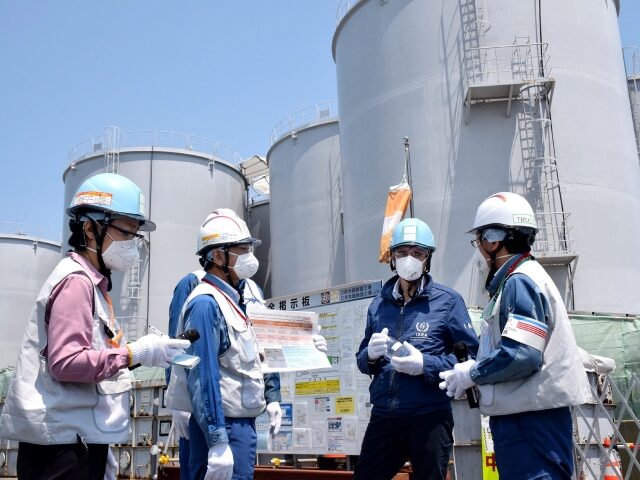Japan’s central government plans to reactivate up to nine nuclear power plants in the next few months to support an expected spike in electricity demand during the upcoming winter season, Japan’s Asahi Shimbun newspaper reported on Friday.
“We are aiming to put as many nuclear reactors as possible online,” Japanese Prime Minister Kishida Fumio told reporters at a July 14 press conference. “We will have up to nine reactors operating this winter to secure enough sources of energy to cover about 10 percent of Japan’s overall power consumption.”
“Kishida said he also instructed government officials to get 10 more units of thermal power plants ready for operations to ensure a stable power supply during peak periods,” the Asahi Shimbun reported on July 15.
The newspaper suggested that Tokyo anticipates “possible power shortages” during the next winter season, or between December 2022 and March 2023.
Japan’s federal government urged households and businesses in Tokyo to reduce their electricity consumption from June 27 to June 29 amid a power supply shortage in the metropolitan region caused by “a spike in demand driven by high temperatures and infrastructure issues,” Kyodo News reported on June 28.
“Aside from the weather, factors including damage sustained by power stations in a strong earthquake that struck in March, primarily in the northeastern Tohoku region, have also compromised available capacity,” the news agency noted at the time.
“[I]t is ‘important’ that Japan restarts its nuclear power stations to ensure it can meet energy requirements,” Kyodo News quoted Japanese Economy, Trade, and Industry Minister Hagiuda Koichi as saying at a press briefing on June 28.
Japanese Chief Cabinet Secretary Matsuno Hirokazu told reporters at the same briefing that Tokyo expected its electricity supply to increase starting around June 29, citing “projected output from power plants that will finish undergoing maintenance and periodic inspections.”
The nine nuclear reactors that Japan’s central government plans to tap for the upcoming winter season’s energy needs “were brought online at least once after passing the Nuclear Regulation Authority’s screening for a restart. Four were in operation as of July 14, the Asahi Shimbun noted on July 15.
The newspaper referred to a stricter standard of operation that Japan’s federal government began requiring of its nuclear plants in 2013 in response to a 2011 meltdown of three nuclear reactors in Japan’s Fukushima prefecture.
“The Fukushima disaster led to a nationwide halt of nuclear plants, with plant operators obliged to meet new safety standards introduced in 2013 before restarting reactors,” Kyodo News recalled on June 17.
“Of the 54 nuclear reactors that had been in operation before the disaster, only 10 have resumed operation under the stricter rules, while another 21 are slated to be decommissioned,” according to the news agency.
A magnitude 9.0 earthquake struck off Fukushima’s coast on March 11, 2011, followed by a related tsunami. The double impact of the natural disaster disabled the power supply and cooling agents of three nuclear power reactors in the prefecture, resulting in a subsequent meltdown at the sites. Fukushima’s combined natural and nuclear disaster in March 2011 caused severe damage to the local environment and population, forcing more than 100,000 people to evacuate their homes.
There have reportedly been “no deaths or cases of radiation sickness from the nuclear accident,” according to a profile of the incident updated by the World Nuclear Association in May.
“Official figures show that there have been 2313 disaster-related deaths among evacuees from Fukushima prefecture. Disaster-related deaths are in addition to the about 19,500 that were killed by the earthquake or tsunami,” the association noted at the time.

COMMENTS
Please let us know if you're having issues with commenting.